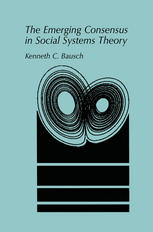

Most ebook files are in PDF format, so you can easily read them using various software such as Foxit Reader or directly on the Google Chrome browser.
Some ebook files are released by publishers in other formats such as .awz, .mobi, .epub, .fb2, etc. You may need to install specific software to read these formats on mobile/PC, such as Calibre.
Please read the tutorial at this link: https://ebookbell.com/faq
We offer FREE conversion to the popular formats you request; however, this may take some time. Therefore, right after payment, please email us, and we will try to provide the service as quickly as possible.
For some exceptional file formats or broken links (if any), please refrain from opening any disputes. Instead, email us first, and we will try to assist within a maximum of 6 hours.
EbookBell Team

0.0
0 reviewsIn The Emerging Consensus of Social Systems Theory Bausch summarizes the works of over 30 major systemic theorists. He then goes on to show the converging areas of consensus among these out-standing thinkers.
Bausch categorizes the social aspects of current systemic thinking as falling into five broadly thematic areas: designing social systems, the structure of the social world, communication, cognition and epistemology.
These five areas are foundational for a theoretic and practical systemic synthesis. They were topics of contention in a historic debate between Habermas and Luhmann in the early 1970's. They continue to be contentious topics within the study of social philosophy.
Since the 1970's, systemic thinking has taken great strides in the areas of mathematics, physics, biology, psychology, and sociology. This book presents a spectrum of those theoretical advances. It synthesizes what various strains of contemporary systems science have to say about social processes and assesses the quality of the resulting integrated explanations.
Bausch gives a detailed study of the works of many present-day systems theorists, both in general terms, and with regard to social processes. He then creates and validates integrated representations of their thoughts with respect to his own thematic classifications. He provides a background of systemic thinking from an historical context, as well as detailed studies of developments in sociological, cognitive and evolutionary theory. This book presents a coherent, dynamic model of a self-organizing world. It proposes a creative and ethical method of decision-making and design. It makes explicit the relations between structure and process in the realms of knowledge and being. The new methodology that evolves in this book allows us to deal with enormous complexity, and to relate ideas so as to draw out previously unsuspected conclusions and syntheses. Therein lies the elegance and utility of this model.